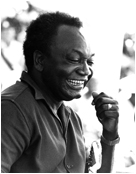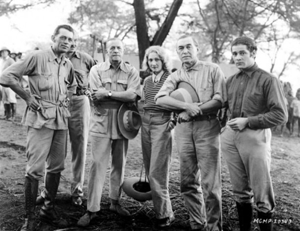
Swahili, also known as Kiswahili, is a Bantu language and the first language of the Swahili people. It is a lingua franca of the African Great Lakes region and other parts of eastern and south-eastern Africa, including Tanzania, Kenya, Uganda, Rwanda, Burundi, Mozambique, and the Democratic Republic of the Congo (DRC). Comorian, spoken in the Comoros Islands is sometimes considered to be a dialect of Swahili, though other authorities consider it a distinct language.
Daystar is a Christian liberal arts university in Nairobi.
The Swahili people are an ethnic and cultural group inhabiting East Africa. Members primarily reside on the Swahili coast, in an area encompassing the Zanzibar archipelago, littoral Kenya, the Tanzania seaboard, and northern Mozambique. The name Swahili is derived from the Arabic word Sawāhil سواحل, meaning coasts. The Swahili speak the Swahili language, which belongs to the Bantu branch of the Niger-Congo family.
Rocha Chimera is a Kenyan writer. He received the Noma Award in 2000 for Ufundishaji wa Fasihi: Nadharia na Mbinu. Chimera holds a B.Ed. and M.A. from Kenyatta University, and a Ph.D. from Ohio University. He is Professor of Swahili and former chair of the Dept. of Languages and Linguistics at Egerton University. Currently, he is the Dean, School of Humanities and Social Sciences at Pwani University college, Kilifi Kenya.
Facing Mount Kenya, first published in 1938, is an anthropological study of the people of the Kikuyu ethnicity of central Kenya. It was written by native Kikuyu and future Kenyan president Jomo Kenyatta.
Bethwell Allan Ogot is a historian from Kenya. He specialises in African history, research methods and theory. One of his works starts by saying that "to tell the story of a past so as to portray an inevitable destiny is, for humankind, a need as universal as tool-making. To that extent, we may say that a human being is, by nature, historicus.
A genitive connector is a part of speech used in formation of compound terms through conjunctions. It is used especially in the Bantu languages to denote special word categories. Nouns can be modified by other nouns or other categories. There is prototypically a head word that comes before the connector and another one following. Long terms can therefore be achieved through the use of these genitive connectors. Commonly used connectors in Swahili take the form -a. Examples from selected bantu languages include.

A sufuria is a Swahili language word, adopted in the local African Great Lakes regional variety of English, for a flat based, deep sided, lipped and handleless cooking pot or container. It is ubiquitous in Kenya, Tanzania and other Great Lakes nations. A replacement for more traditional crockery containers, it used in many Kenyan households for cooking, serving and storing food. Most sufuria are today made of aluminum, and produced and purchased locally in the informal sector. Sufuria were traditionally used to cook over open fire, charcoal brazier, or coals, and are purchased in a variety of sizes, with and without lids.
Chama cha Kiswahili cha Taifa is a Kenyan institution founded in 1998 responsible for the promotion of the Swahili language in Kenya. The Founding Chair is Prof. Kimani Njogu, a graduate of Yale University's department of Linguistics.

Ronald Gideon Ngala (1923–1972) was a Kenyan politician who was the leader of the Kenya African Democratic Union political party from its creation in 1960 until its dissolution in 1964.

Sir William Frederick Gowers, KCMG was a British colonial administrator who was Governor of Uganda from 1925 to 1932.
Abdilatif Abdalla is a Kenyan writer and political activist. He was imprisoned for his support of the Kenya People's Union, and wrote the poems collected in Sauti ya Dhiki while in solitary confinement, which were subsequently awarded the Jomo Kenyatta Prize for Literature.
Shungwaya is an origin myth of the Mijikenda peoples.
Traditions known collectively as the Shungwaya Myth describe a series of migrations of Bantu peoples dating to the 12th-17th centuries from a region to the north of the Tana River. These Bantu migrants were held to have been speakers of Sabaki Bantu languages. Other Bantu ethnic groups, smaller in number, are also suggested to have been part of the migration. From Shungwaya, the Mount Kenya Bantu are then proposed to have broke away and migrated from there some time before the Oromo onslaught.Shungwaya appears to have had its heyday as a Bantu settlement area between perhaps the 12th and the 15th centuries, after which it was subjected to a full-scale invasion of Cushitic-speaking Oromo peoples from the Horn of Africa..From the whole corpus of these traditions, it has been argued that Shungwaya comprised a large, multi-ethnic community.
Austin Bukenya is a Ugandan poet, playwright, novelist and academic. He is the author of the novel The People's Bachelor, and a play, The Bride. He has taught languages, literature and drama at Makerere University in Uganda and universities in the UK, Tanzania and Kenya since the late 1960s. He has also held residences at universities in Rwanda and Germany. Bukenya is also a literary critic, novelist, poet and dramatist. An accomplished stage and screen actor, he was for several years Director of the Creative and Performing Arts Centre at Kenyatta University, Nairobi.

David Peter Simon Wasawo was a Kenyan zoologist, conservationist, and university administrator. After studying at Uganda's Makerere University he earned an M.A. at the University of Oxford and a PhD at University of London. He taught at Makerere University, and was professor and Dean of the Faculty of Science at the University of Nairobi, and later chancellor of Great Lakes University of Kisumu.
Rebecca Nandwa is a Kenyan writer who is best known for her children's books written in Swahili. She has been involved in a wide range of journalism and editorial work and used to be a teacher.
Dr. Kimani Njogu is Kenyan linguist known for his role in study and advocacy of Kiswahili language.
Farouk Mohamedhusein Tharia Topan is the director of the Swahili Centre at the Aga Khan University. He is a specialist in the language and literature of the Swahili people. He has taught at the University of Dar es Salaam, the Institute of Ismaili Studies, and the School of Oriental and African Studies.









